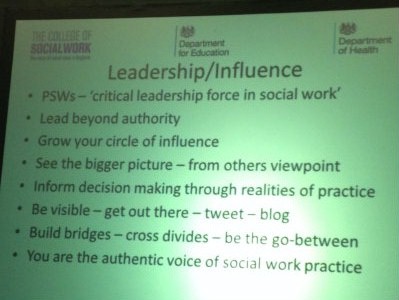
The head of leadership development charity Common Purpose UK has urged principal social workers to believe in their power to improve social work.
The call was made by chief executive Marie Mohan in her keynote speech to the 150 principal social workers (PSWs) who gathered in London on Tuesday for the first-ever joint meeting of PSWs from adult and children’s services throughout the country.
The meeting, hosted by the College of Social Work, aimed to allow PSWs to discuss the relatively new role, which was created in the wake of recommendations from the Munro review to help encourage higher standards of social work practice at local level.
Some may feel lost in the unfamiliar territory of the comparatively new role, but Mohan encouraged the assembled social workers to believe in the power of what they can do here and now, with small actions in each local authority. She described the ways acts as small and simple as talking to people outside your industry can help you to illuminate your own practice.
Quoting Irish thinker Charles Handy, she urged the social workers present: “Go and ‘light your own small fires in the darkness.’”
Mohan spoke of the importance of understanding your place in the wider world and not just becoming insular within your own community, something that had resonance for a conference aiming to forge a strong national network of disparate local authorities.
Annie Hudson, chief executive of the College of Social Work, said: “The conference afforded good opportunity for listening, networking and taking stock of how PSWs can and are having positive traction on social work practice in local areas. There was much valuable and vibrant debate about how the role is developing along with the chance of hearing how practically PSWs are executing their roles.”
The recurring themes of the day were around leadership, defining the role and influencing practice, not just enforcing process. A number of principal social workers stood up to talk positively about the ways they have shaped the role themselves, with little guidance around what the position’s purpose and remit should be.Some described bringing more reflective supervision to their teams, and refocusing on practice rather than on systems and processes.
However, others around the table-top discussion discussed feeling unsure of their place in the team.
“PSWs are often what was described as a ‘go between’ – between practitioners and managers, between adult and children’s services and between national and local networks,” said Hudson who added that “it is the case that the role is not only being developed but it is being developed differently across the country”.
“We need to find ways of disseminating and sharing some of the innovative work that PSWs are doing, to encourage PSWs to share best practice and also, as importantly, to have a strong and influential voice on social work policy and practice matters,” she added.


 Bournemouth, Christchurch and Poole
Bournemouth, Christchurch and Poole  Hampshire County Council
Hampshire County Council  Lincolnshire County Council
Lincolnshire County Council  Norfolk County Council
Norfolk County Council  Northamptonshire Children’s Trust
Northamptonshire Children’s Trust  South Gloucestershire Council
South Gloucestershire Council  Wiltshire Council
Wiltshire Council  Wokingham Borough Council
Wokingham Borough Council  Children and young people with SEND are ‘valued and prioritised’ in Wiltshire, find inspectors
Children and young people with SEND are ‘valued and prioritised’ in Wiltshire, find inspectors  How specialist refugee teams benefit young people and social workers
How specialist refugee teams benefit young people and social workers  Podcast: returning to social work after becoming a first-time parent
Podcast: returning to social work after becoming a first-time parent  Podcast: would you work for an inadequate-rated service?
Podcast: would you work for an inadequate-rated service?  Family help: one local authority’s experience of the model
Family help: one local authority’s experience of the model  Workforce Insights – showcasing a selection of the sector’s top recruiters
Workforce Insights – showcasing a selection of the sector’s top recruiters 

 Facebook
Facebook X
X LinkedIn
LinkedIn Instagram
Instagram
Comments are closed.